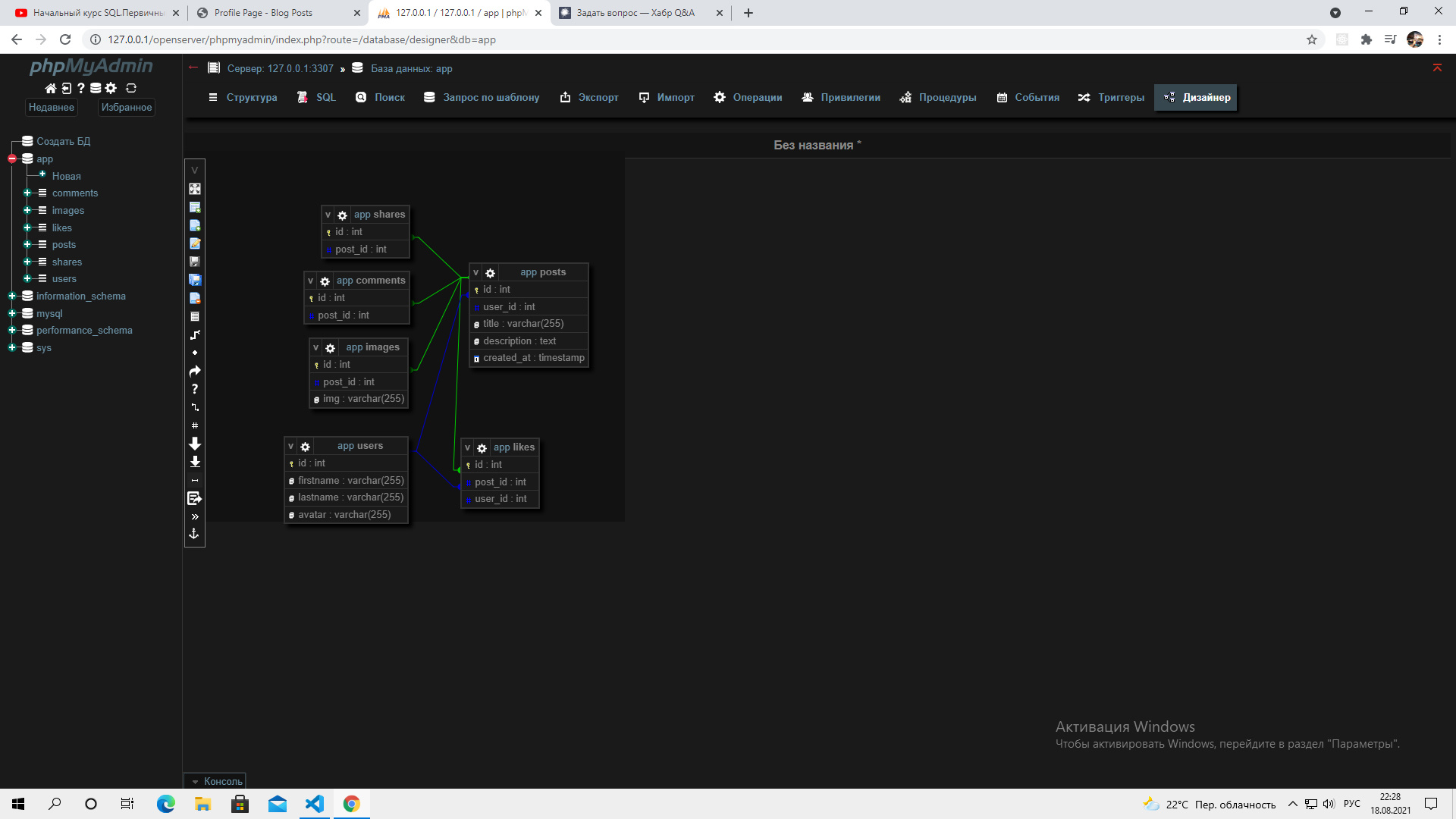Answer the question
In order to leave comments, you need to log in
How can arrays be stored in cells in a table?


In Lark there are links Eloquent ORM can be easier to rewrite? Or it will not help I would be grateful for articles, books, etc. I’m unlikely to master it myself (
One To One
One To Many
One Of Many
Many To Many
How can such a conclusion be formed without hard coda? Or the connections are not correct or it is impossible
with one request
Array
(
[0] => Array
(
[id] => 1
[firstname] => James
[lastname] => Spiegel
[avatar] => author-page.jpg
[created_at] => 2021-08-18 13:42:17
[title] => My Perfect Vacations in South America and Europe
[description] => Lorem ipsum dolor sit amet
[count_likes] => 6
[count_comments] => 0
[count_shares] => 0
[images_photo] => Array
(
[0] => post-photo1.jpg
[1] => post-photo1.jpg
)
)
);[images_photo] => Array
(
[0] => post-photo1.jpg
[1] => post-photo1.jpg
)$host = '127.0.0.1';
$port = '3307';
$db = 'app';
$user = 'root';
$pass = '';
$charset = 'utf8';
$auth = 1;
$dsn = "mysql:host=$host;port=$port;dbname=$db;charset=$charset";
$opt = [
PDO::ATTR_ERRMODE => PDO::ERRMODE_EXCEPTION,
PDO::ATTR_DEFAULT_FETCH_MODE => PDO::FETCH_ASSOC,
PDO::ATTR_EMULATE_PREPARES => false,
];
$pdo = new PDO($dsn, $user, $pass, $opt);
$query = 'SELECT users.id, users.firstname, users.lastname, users.avatar, posts.created_at, posts.id, posts.title, posts.description, ' .
'(SELECT COUNT(likes.id) FROM likes WHERE likes.post_id = posts.id) as count_likes,' .
'(SELECT COUNT(comments.id) FROM comments WHERE comments.post_id = posts.id) as count_comments,' .
'(SELECT COUNT(shares.id) FROM shares WHERE shares.post_id = posts.id) as count_shares,' .
'(SELECT COUNT(images.id) FROM images WHERE images.post_id = posts.id) as count_image' .
' FROM posts
INNER JOIN users ON users.id = posts.user_id AND users.id = ' . $auth;
$query1 = 'SELECT * FROM images';
$query2 = 'SELECT users.id, users.firstname, users.avatar, likes.post_id FROM likes INNER JOIN users ON likes.user_id = users.id ORDER BY likes.id ASC';
$posts = $pdo->query($query)->fetchAll(PDO::FETCH_ASSOC);
$images = $pdo->query($query1)->fetchAll(PDO::FETCH_ASSOC);
$likes = $pdo->query($query2)->fetchAll(PDO::FETCH_ASSOC);
function add($posts, $images, $likes)
{
foreach($posts as $key => $post)
{
foreach($images as $image)
{
if ($post['id'] === $image['post_id'])
{
$posts[$key]['images'][] = $image['img'];
}
}
foreach($likes as $like)
{
if ($post['id'] === $like['post_id'])
{
$posts[$key]['likes'][] = $like['avatar'];
$posts[$key]['users'][] = $like['firstname'];
}
}
}
return $posts;
}
$posts = add($posts, $images, $likes);
echo '<pre>';
print_r($posts);
echo '</pre>';Answer the question
In order to leave comments, you need to log in
If you want to pull out with one request, then JSON_ARRAYAGG will help you.
And so the logic is correct, but do not pull out all the images, but those that relate to your posts.
Didn't find what you were looking for?
Ask your questionAsk a Question
731 491 924 answers to any question